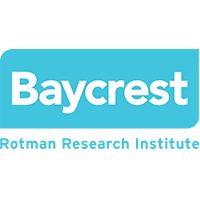
13 Feb PostDoc – Auditory Cognitive Neuroscience
The Rotman Research Institute at Baycrest has an opportunity for a
POSTDOCTORAL FELLOW – FULL TIME
Two years – 70.00 Hours bi-weekly – Non-Union
The Rotman Research Institute (RRI) is a premier international centre for the study of human brain function. The RRI is committed to advancing knowledge of healthy aging and age-related brain disorders, such as dementia, stroke, and sensory loss, by building on its foundational strengths in cognitive neuroscience and its leadership in the innovative use of informatics, electrophysiology, and neuroimaging technologies.
The postdoctoral fellow will be supervised by Dr. Björn Herrmann in collaboration with other scientists and trainees in the Rotman Research Institute. The successful applicant will use behavioral/psychophysical methods, eye-tracking, electrophysiological methods (EEG/MEG), and/or functional neuroimaging (fMRI) in younger and older listeners to study how sound, particularly (but not exclusively) speech, is processed by the brain, and how cognitive challenges may impact these processes. The final project will depend on the fellow’s skills and interests and the interaction with other lab members. The fellowship will start August/September 2020 and offers ample opportunity for collaborations both within the institute and with other researchers in Toronto. Applications will be reviewed beginning March 15, 2020.
Responsibilities include but are not limited to:
- Experimental design, data collection and analysis, manuscript preparation
- Behavioural studies, including eye-tracking
- Multimodal functional neuroimaging, including EEG, MEG, and/or fMRI
- Data analysis using advanced, multivariate statistical tools applied to EEG, MEG, or fMRI data
Qualifications include but are not limited to:
- PhD or equivalent degree in psychology, cognitive neuroscience, hearing science, physiology, electrical engineering, or similar
- Advanced quantitative and computer skills, including the ability to use Matlab, Python, or any other programming language that enables experiment design and data analysis
- Experience recruiting and testing research participants
- Experience with EEG, MEG, or fMRI data collection and analysis
- Effective oral and written communication skills
Application Guidelines:
All individuals interested in conducting exciting research to understand how we engage in listening and communication as we age are encouraged to apply. We are committed to employment equity and diversity in the workplace and welcome applications from women, members of racialized groups/visible minorities, Aboriginal persons, persons with disabilities, persons of any sexual orientation, and persons of any gender identity or gender expression.
In order to minimize any implicit bias in the initial review of applications, we require all applicants to submit two independent application documents: One main application file and one supplementary anonymized application file. Only the anonymized information will be used for the initial screening and rating of applicants. We hope this process will minimize unconscious bias effects, building on the efforts articulated in the following reference: Jones CS & Urban MC (2013) Promise and Pitfalls of a Gender-Blind Faculty Search. BioScience 63:611–612. doi.org/10.1525/bio.2013.63.8.3
Main application (single pdf; YY_20-0077_main.pdf à replace YY by your initials):
- A brief cover letter (half a page to a page) describing your interest in the lab
- A detailed curriculum vitae
- One selected publication or pre-print
- Two names of references who can be contacted, including the PhD advisor
Anonymized application (single pdf; YY_20-0077_anonymized.pdf à replace YY by your initials):
The file should not include your name or any identifiers. This file should include the following sections:
- Most significant research contribution (300 words or less). Describe a single publication, or a set of publications. Indicate its/their current status (e.g., published, preprint). What is it about? How has it advanced your field? What was your contribution? Do not include your name. If referring to publications, please follow the guidelines below.
- Most significant other contribution (300 words or less). This may or may not be a research contribution. Other areas are leadership, public outreach, contributions to EDI, contributions to training, methods or theoretical development, symposia/workshop organization, or any other area where you feel you made a significant contribution. Do not include your name. If referring to publications, please follow the guidelines below.
- Education and experience: List your postsecondary degrees and years awarded. List the field of research (e.g., Psychology) for each degree but do not list the institution. List any previous postdoctoral fellowships with start and end dates and research field, but do not name institutions or supervisors.
- Honours, Awards, Grants: List honours, awards, and research grants with dates of the awards. For national or international awards list full award/grant information. For institutional awards describe the award but do not list the institution name.
- Publications: Provide a list of publications organized by type (e.g., review articles, research article, book chapter, etc.) and status (e.g., published, preprint, in revision). Do not list author names, but do provide title, journal title and year. Briefly annotate each publication to indicate your contribution (first/primary author, middle-author and collaborator, etc.) and provide the current number of lifetime citations.
Internal applicants: It is preferred that you submit your application online via our intranet. Please ensure that your updated resume is submitted with your application. Failure to submit your resume, may affect your candidacy for this position.
Please click here to apply.


Sorry, the comment form is closed at this time.